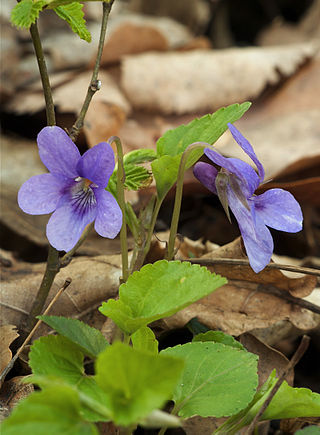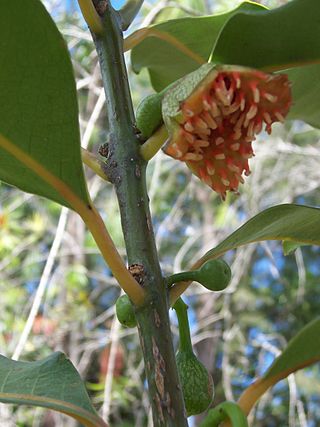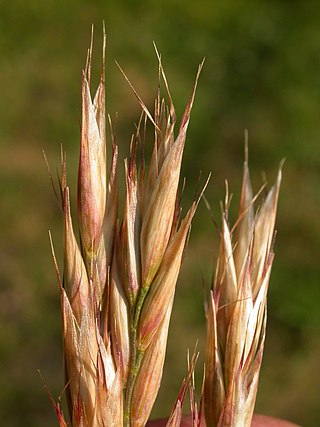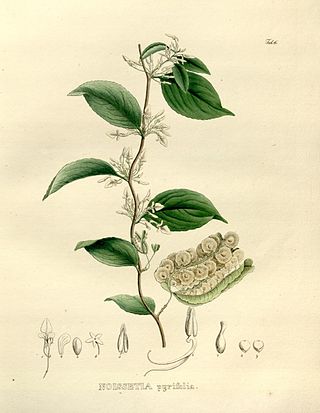Related Research Articles

Viola is a genus of flowering plants in the violet family Violaceae. It is the largest genus in the family, containing over 680 species. Most species are found in the temperate Northern Hemisphere; however, some are also found in widely divergent areas such as Hawaii, Australasia, and the Andes.

Violaceae is a family of flowering plants established in 1802, consisting of about 1000 species in about 25 genera. It takes its name from the genus Viola, the violets and pansies.

Alstroemeriaceae is a family of flowering plants, with 254 known species in four genera, almost entirely native to the Americas, from Central America to southern South America. One species of Luzuriaga occurs in New Zealand, and the genus Drymophila is endemic to south-eastern Australia.

Cardamine is a large genus of flowering plants in the mustard family, Brassicaceae, known as bittercresses and toothworts. It contains more than 200 species of annuals and perennials. Species in this genus can be found in diverse habitats worldwide, except the Antarctic. The name Cardamine is derived from the Greek kardaminē, water cress, from kardamon, pepper grass.

The Monimiaceae is a family of flowering plants in the magnoliid order Laurales. It is closely related to the families Hernandiaceae and Lauraceae. It consists of shrubs, small trees, and a few lianas of the tropics and subtropics, mostly in the southern hemisphere. The largest center of diversity is New Guinea, with about 75 species. Lesser centres of diversity are Madagascar, Australia, and the neotropics. Africa has one species, Xymalos monospora, as does Southern Chile. Several species are distributed through Malesia and the southwest Pacific.

Schinus is a genus of flowering trees and tall shrubs in the sumac family, Anacardiaceae. Members of the genus are commonly known as pepper trees. The Peruvian pepper tree is the source of the spice known as pink peppercorn.

Calandrinia is a genus of flowering plants known as purslanes and redmaids. It includes 37 species of annual and perennial herbs which bear colorful flowers in shades of red to purple and white. Species of this genus are native to the Americas, including western and southern South America, Central America, and western North America. Some species have been introduced to parts of Australia, New Zealand, southern Africa, Asia, and Europe. Over 60 species native to Australia and New Guinea that were formerly included in Calandrinia are now placed in a separate genus, Rumicastrum or Parakeelya. A single eastern Australian species named in 2022, Calandrinia petrophila, is still included in Calandrinia, but will be placed into the Australian genus when the name of the new genus is finally settled.

Olsynium is a genus of summer-dormant rhizomatous perennial flowering plants in the iris family Iridaceae, native to sunny hillsides in South America and western North America.
Kevin R. Thiele is currently an adjunct associate professor at the University of Western Australia and the director of Taxonomy Australia. He was the curator of the Western Australian Herbarium from 2006 to 2015. His research interests include the systematics of the plant families Proteaceae, Rhamnaceae and Violaceae, and the conservation ecology of grassy woodland ecosystems. He also works in biodiversity informatics, developing and teaching the development of interactive multi-access keys, and has been involved in the design of software for the Global Biodiversity Information Facility.

Danthonia is a genus of Eurasian, North African, and American plants in the grass family. Members of this genus are sometimes referred to as oatgrass, but that common name is not restricted to this genus. Other common names include heathgrass and wallaby grass. Australian species have since been reclassified into the genus Rytidosperma.

Pieter B. Pelser is a lecturer in Plant Systematics and the curator of the herbarium at the University of Canterbury in Christchurch, New Zealand. One research interest is the evolutionary history of the tribe Senecioneae, one of the largest tribes in the largest family of flowering plants. He wrote the most recent attempt to define and delimit this tribe and its problematic founding species Senecio. He also studies insects that eat these plants (Longitarsus) which contain pyrrolizidine alkaloids and what makes them choose which plants they eat.

Dr Maarten Joost Maria Christenhusz is a Dutch botanist, natural historian and photographer.
Leslie Andrew Garay, born Garay László András, was an American botanist. He was the curator of the Oakes Ames Orchid Herbarium at Harvard University, where he succeeded Charles Schweinfurth in 1958. In 1957 he was awarded a Guggenheim Fellowship.

Balbisia is a genus of flowering plants belonging to the family Francoaceae. It is also in the Vivianiaceae subfamily.
Viola angustifolia is a species of flowering plant in the genus Viola.

Schweiggeria is a genus of flowering plants in the violet family Violaceae, with one or two species, found in eastern Brazil.

Anchietea is a genus of flowering plants in the violet family Violaceae, with six accepted species, found in tropical South America.

Erythranthe naiandina, the Chilean monkey flower, is a perennial species of flowering plant in the family Phrymaceae. It is native to Chile. This plant has been awarded the Award of Garden Merit by the Royal Horticultural Society. It was formerly known as Mimulus naiandinus.
Arve Elvebakk is a Norwegian mycologist and professor working from the Arctic University of Norway in Tromsø. He has published widely on Arctic biology, and climatology. Additionally, he collaborates with many mycologists across the world, and has published names for lichens in Australia, New Zealand, the South Pacific, and South America, and the Antarctic.
Henricus (Harrie) Johannes Maria Sipman is a retired Dutch lichenologist who specialised in tropical and subtropical lichens and authored or co-authored over 250 scientific publications. He was the curator of the lichen herbarium at the Berlin Botanical Garden and Botanical Museum from 1983 until his retirement in 2010.
References
- ↑ Watson, John M (31 December 2009). "A new and rare rosulate species of Viola (Violaceae) from Argentina" (PDF). Phytotaxa . 2. doi:10.11646/phytotaxa.2.1.3.
- ↑ Ward, Bobby J. (2004). The plant hunter's garden: the new explorers and their discoveries. ISBN 0881926965.
- ↑ International Plant Names Index. J.M.Watson.